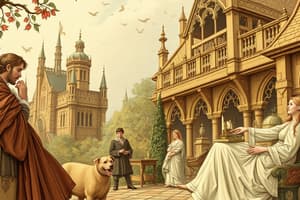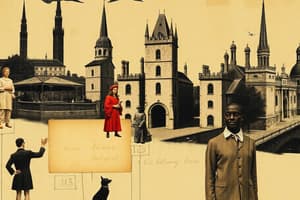Podcast
Questions and Answers
What season is described at the beginning of The Canterbury Tales?
What season is described at the beginning of The Canterbury Tales?
- Winter
- Summer
- Spring (correct)
- Autumn
Who is the narrator's destination during the pilgrimage?
Who is the narrator's destination during the pilgrimage?
Canterbury
Both writers used completely different sources for their stories.
Both writers used completely different sources for their stories.
False (B)
What prompts the storytellers in The Decameron to tell their tales?
What prompts the storytellers in The Decameron to tell their tales?
What is one of the main themes explored in The Canterbury Tales?
What is one of the main themes explored in The Canterbury Tales?
What role does storytelling play in The Canterbury Tales?
What role does storytelling play in The Canterbury Tales?
Chaucer's pilgrims come from the same social class.
Chaucer's pilgrims come from the same social class.
What is the relationship between men and women as explored in Chaucer's stories?
What is the relationship between men and women as explored in Chaucer's stories?
The journey of humanity towards forms of cooperation and equality was largely unknown in the _______.
The journey of humanity towards forms of cooperation and equality was largely unknown in the _______.
Flashcards
Canterbury Tales similarities to Decameron
Canterbury Tales similarities to Decameron
Both works share frame tales, character similarities, and use earlier stories, but differ in storytelling approach, focusing on real people rather than abstract figures.
Canterbury Tales' pilgrimage setting
Canterbury Tales' pilgrimage setting
The story takes place in spring, with pilgrims journeying to Canterbury to see Saint Thomas Becket's shrine.
Frame tale structure
Frame tale structure
A story containing multiple connected stories, often acting as a setting or framework.
The Decameron's setting
The Decameron's setting
Signup and view all the flashcards
Social Subversion in Canterbury Tales
Social Subversion in Canterbury Tales
Signup and view all the flashcards
Canterbury Tales' common themes
Canterbury Tales' common themes
Signup and view all the flashcards
Cooperation in Canterbury Tales
Cooperation in Canterbury Tales
Signup and view all the flashcards
Storytellers in the Decameron
Storytellers in the Decameron
Signup and view all the flashcards
Storytelling in the Canterbury Tales
Storytelling in the Canterbury Tales
Signup and view all the flashcards
Pilgrimage in Canterbury Tales
Pilgrimage in Canterbury Tales
Signup and view all the flashcards
Study Notes
Canterbury Tales and the Decameron
- Both works share striking similarities, including a frame tale structure and similar characters/stories.
- Shared medieval storytelling heritage explains similarities.
- Authors borrowed from earlier sources, often the same ones.
- Key innovation: focusing on real people, rather than abstract figures.
General Prologue
- Prologue begins with a description of spring and the season for pilgrimages.
- Pilgrims travel to Canterbury to visit Saint Thomas Becket's shrine.
- Narrator joins the group of pilgrims at the Tabard Inn in Southwark.
- All pilgrims agree to travel together the following day.
Storytelling in the Middle Ages
- Similar to Chaucer's Canterbury Tales, Boccaccio's Decameron is a collection of stories set within a frame tale.
- Decameron stories are told by people fleeing Florence's plague.
- Chaucer's pilgrims' stories reflect the diverse social classes of medieval England and their characters.
Opening Lines/Time and Setting
- The opening lines describe spring, a time of renewal and pilgrimage.
- People feel inspired to make pilgrimages at that time.
- The pilgrimage to Canterbury, a major destination.
Social Subversion
- Chaucer portrays a detailed and critical image of medieval English society.
- Characters represent various social classes (nobility, clergy etc).
- Chaucer satirizes societal members who fail to meet their social responsibilities.
- Medieval society is not rigid; new trends are slowly emerging, exemplified by characters who are powerful within their communities. (Doctor, Cook, Shipman).
- Characters like the Wife of Bath challenge the traditional role and expectations of women by emphasizing independence and financial power
- He criticizes the Church's wealth and the corruption and hypocrisy of religious figures. - People from all social classes take part in a collective journey.
Geoffrey Chaucer: A Poet and Traveller
- Chaucer, a wealthy family's son, received a good education.
- Connected to the royal family and the court of John of Gaunt.
- Chaucer's travels allowed him to broaden his knowledge, especially of French/Italian writers, like Dante and Boccaccio.
- He worked as diplomat/negotiator, traveling extensively throughout Europe.
- Observed people and culture in countries traveled to.
- Wrote Canterbury Tales between 1387 and 1400.
- Died in 1400 and buried in Westminster Abbey.
The Canterbury Tales: A Timeless Masterpiece
- Chaucer's work is considered the first published book of English poetry.
- Chaucer transformed English into a literary language.
- The Canterbury Tales is a narrative poem.
- Poem is structured using iambic pentameter rhyming couplets.
- Poem reflects the realities/characteristics of Medieval England.
Other Works
- Chaucer's work spans several phases: "French Period", "Italian Period", "English Period".
- Included works like The Romaunt of the Rose, The Book of the Duchess, The Parliament of Foules, Troilus and Criseyde, and A Treatise on the Astrolabe.
- The Canterbury Tales is his masterpiece.
Chaucer and the Universal Journey of Mankind
- Chaucer's Canterbury Tales is more than just a religious journey.
- Pilgrimage represents a life-changing journey of discovery, exploration, and human interactions.
- The theme of journey is universal and timeless (Ulysses).
- Illustrates mankind's universal journey of discovery.
A Portrait of English Society
- Chaucer's work portrays a realistic picture of medieval society in England.
- Pilgrimage to Canterbury unites the characters.
- The pilgrimage was a common practice and significant part of medieval life.
- Chaucer criticizes the Church, highlighting contrasts between its wealth and the lives of its people.
Studying That Suits You
Use AI to generate personalized quizzes and flashcards to suit your learning preferences.




